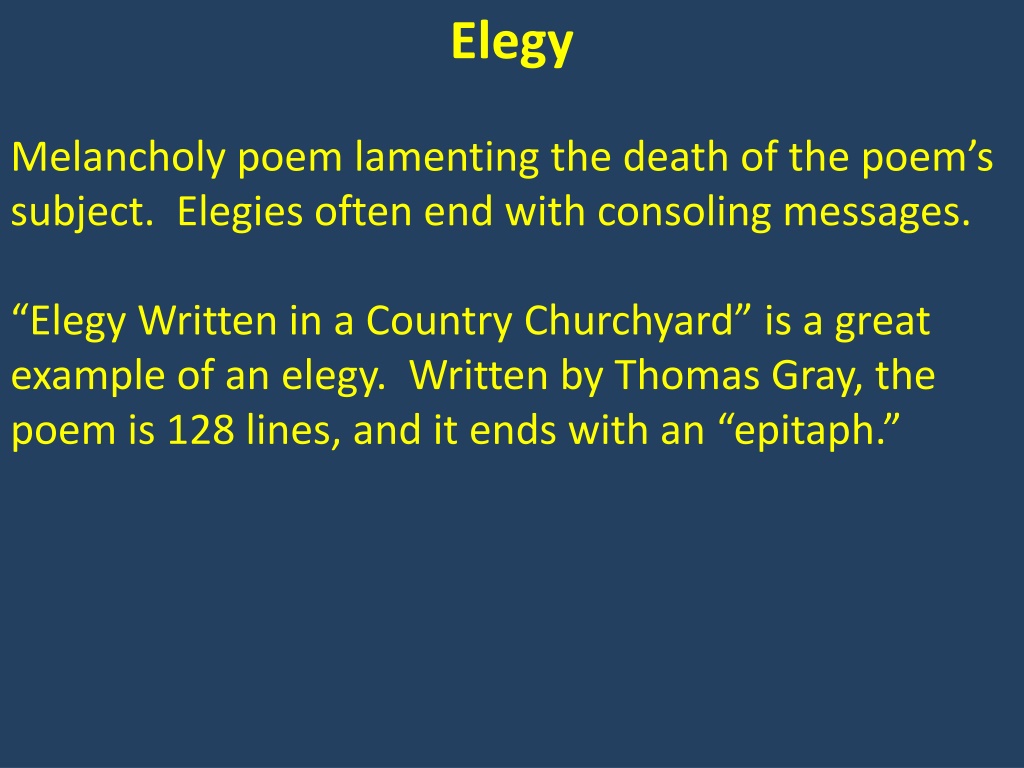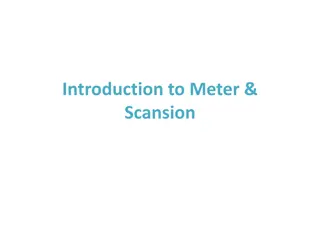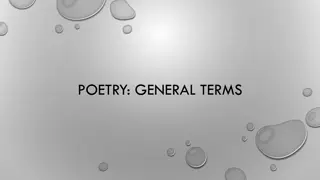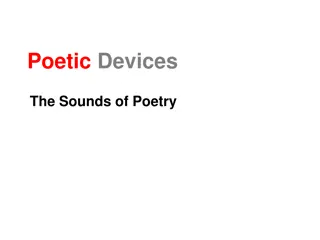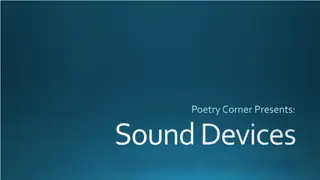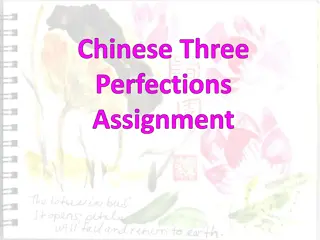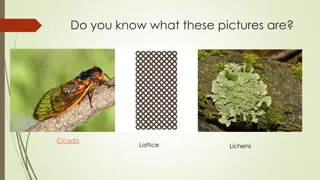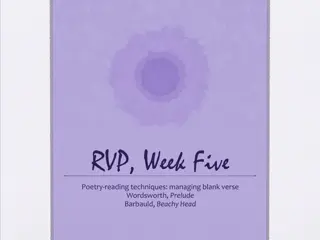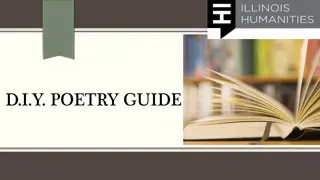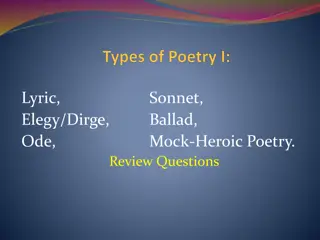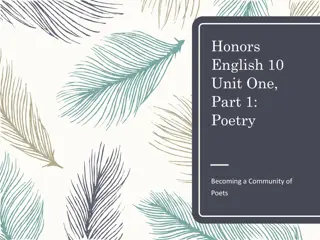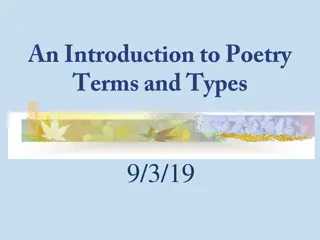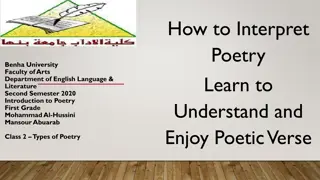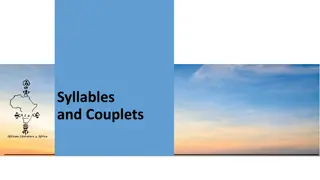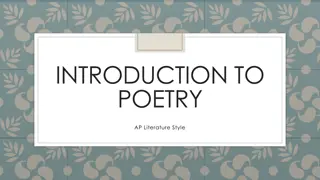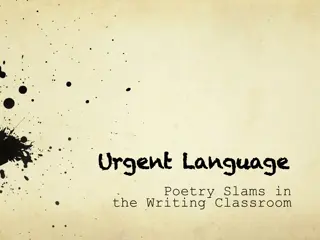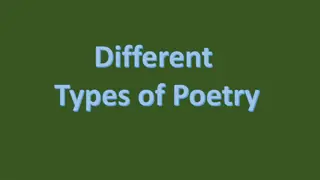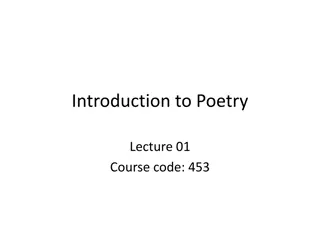Explore Poetry: An Overview of Different Poetic Forms and Examples
Delve into the world of poetry with an exploration of various forms like elegy, epitaph, ode, hymn, sonnet, and ballad. Discover examples from renowned poets such as Thomas Gray, Robert Herrick, Robert Creeley, Julia Ward Howe, Claude McKay, and Edgar Allan Poe. Each form showcases a unique style and purpose, from lamenting loss in elegies to praising God in hymns, and telling stories in ballads. Uncover the beauty and diversity of poetic expression through this captivating journey.
Download Presentation

Please find below an Image/Link to download the presentation.
The content on the website is provided AS IS for your information and personal use only. It may not be sold, licensed, or shared on other websites without obtaining consent from the author. Download presentation by click this link. If you encounter any issues during the download, it is possible that the publisher has removed the file from their server.
E N D
Presentation Transcript
Elegy Melancholy poem lamenting the death of the poem s subject. Elegies often end with consoling messages. Elegy Written in a Country Churchyard is a great example of an elegy. Written by Thomas Gray, the poem is 128 lines, and it ends with an epitaph.
Epitaph Short poem intended as an inscription on a grave can serve as a brief elegy. Upon a Child That Died by Robert Herrick Here she lies, a pretty bud, Lately made of flesh and blood, Who as soon fell fast asleep As her little eyes did peep. Give her strewings, but not stir The earth that lightly covers her.
Ode Formal, ceremonious poem Addresses & celebrates a person, place, object, idea, image or emotion Stanza form varies
America, you ode for reality! Give back the people you took. America by Robert Creeley Let the sun shine again on the four corners of the world you thought of first but do not own, or keep like a convenience. People are your own word, you invented that locus and term. Here, you said and say, is where we are. Give back what we are, these people you made, us, and nowhere but you to be.
Hymn A poem praising God or the divine. Hymns are often sung. Julia Ward Howe s Battle Hymn of the Republic is a famous example.
Sonnet 14-line poem; sonnet means little song There are many types of sonnets, but the most famous is the English or Shakespearean Sonnet: One stanza of three quatrains Ends with a couplet Rhyme scheme is: ABABCDCDEFEFGG The rhyme scheme can vary a bit
America by Claude McKay Although she feeds me bread of bitterness, And sinks into my throat her tiger s tooth, Stealing my breath of life, I will confess I love this cultured hell that tests my youth. Her vigor flows like tides into my blood, Giving me strength erect against her hate, Her bigness sweeps my being like a flood. Yet, as a rebel fronts a king in state, I stand within her walls with not a shred Of terror, malice, not a word of jeer. Darkly I gaze into the days ahead, And see her might and granite wonders there, Beneath the touch of Time s unerring hand, Like priceless treasures sinking in the sand.
Ballad Popular poems, narratives (tell a story), began as an oral tradition. Ballads do have a rhyme scheme. Edgar Allan Poe s Annabel Lee is a ballad.
Villanelle French verse form Six stanzas First five stanzas have three lines Last stanza is a quatrain (four lines) Includes a refrain Has a specific rhyme scheme See examples:
The art of losing isnt hard to master; so many things seem filled with the intent to be lost that their loss is no disaster. One Art by Elizabeth Bishop Lose something every day. Accept the fluster of lost door keys, the hour badly spent. The art of losing isn t hard to master. Then practice losing farther, losing faster: places, and names, and where it was you meant to travel. None of these will bring disaster. I lost my mother s watch. And look! my last, or next-to-last, of three loved houses went. The art of losing isn t hard to master. I lost two cities, lovely ones. And, vaster, some realms I owned, two rivers, a continent. I miss them, but it wasn t a disaster. Even losing you (the joking voice, a gesture I love) I shan t have lied. It s evident the art of losing s not too hard to master though it may look like (Write it!) like disaster.
They are all gone away, The House is shut and still, There is nothing more to say. The House on the Hill by Edwin Arlington Robinson Through broken walls and gray The winds blow bleak and shrill: They are all gone away. Nor is there one to-day To speak them good or ill: There is nothing more to say. Why is it then we stray Around the sunken sill? They are all gone away, And our poor fancy-play For them is wasted skill: There is nothing more to say. There is ruin and decay In the House on the Hill: They are all gone away, There is nothing more to say.
Japanese Forms Haiku Three un-rhyming lines Line 1 is 5 syllables Line 2 is 7 syllables Line 3 is 5 syllables On a branch floating downriver a cricket, singing. by Kobayashi Issa (translated by Jane Hirshfield)
Japanese Forms Tanka Five lines with 31 syllables in all: 5 syllables 7 syllables 5 syllables 7 syllables 7 syllables
FOR SATORI Two Tanka In the spring of joy, when even the mud chuckles, my soul runs rabid, snaps at its own bleeding heels, and barks: What is happiness? SOMBER GIRL by Philip Appleman She never saw fire from heaven or hotly fought with God; but her eyes smolder for Hiroshima and the cold death of Buddha.
